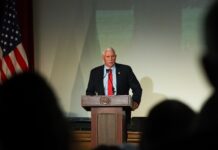Andrew Young has three weeks and two days left in his internship before he can earn his degree in social work. This semester, the 27-year-old from Beaver Falls, Pa. experienced a non-contact injury, resulting in torn cartilage in his chest. After contracting bronchitis that following week, he missed two weeks of classes, leading to his decision to medically withdraw from SRU on Sept. 27.
While he can still finish his internship in an upcoming semester, he may not be able to afford to obtain his degree or copies of his transcript, as he now owes SRU $3,600 for the fall 2018 semester.
That, combined with $6,000 annual salary and his status as a Medicaid recipient, leads to what Young calls his “perfect storm.” He said he currently owes $44,000 in federal student loans—that’s roughly $10,000 more than the average SRU student loan debt.
“I can’t get myself out of this,” Young said.
Young is at risk for defaulting on his loans which occurs, under federal law, if one fails to pay federal loan payments for 270 days.
When Young medically withdrew from SRU in fall 2016 and returned the following spring, he received a partial refund. Since he withdrew from SRU prior to completing 60 percent of the term this second time, his federal loans were returned back to the federal government under Title IV.
“I owe the university over half of what I made last year for one semester,” Young said.
In order to receive Medicaid eligibility, an adult between the ages 19 of 64 must have an income less than 133 percent of the federal poverty level. For Young, this income is $16,146.20.
“Finding a job has never been a problem,” Young said, adding that the salary from his part-time job must remain below the Medicaid eligibility threshold.
In a recent report from the U.S. Department of Education, 5 percent of students who left SRU in the 2015 fiscal year are in default compared to 7.1 percent of students from all U.S. public, four-year schools. Of the 2,497 students who left SRU in 2015 and entered repayment, 127 defaulted.
The federal loan cohort default rate (CDR) is tracked for three years after a specific graduation year. Each student who enters default within three years counts as a defaulted student, according to Alyssa Dobson, director of financial aid and scholarships.
Each student receiving federal financial aid is required to sign a Master Promissory Note (MPN), which serves as a contract and obligation to repay. The MPN also outlines the consequences of defaulting. The consequences for defaulting on loans could include a damaged credit score, garnished wages, loss of Social Security benefits during retirement and loss of income tax refunds.
“It’s definitely a serious status,” Dobson said.
According to Dobson, students who are most likely to default either leave without finishing a degree, have a lower socioeconomic status or are first-generation college students. Once a person is in a default, she or he cannot receive any additional federal financial aid, posing a barrier to returning to school and obtaining a degree.
“You can’t even, at that point, go back to school to try to finish your degree to make the money to pay back the loans,” Dobson said. “Once you end up in default, life is very difficult, and if you haven’t finished your degree at that point, it is yet another barrier to completion.”
The default rate for former SRU students in 2015 is the second lowest in the Pennsylvania State System of Higher Education (PASSHE) after West Chester (4.1 percent).
Dobson attributes the lower default rate at SRU to student support from the Office of Career Education and Development. According to the office’s 2017 annual report, 58 percent of bachelor degree recipients from December 2015 and May and August 2016 are in a full-time job in their career field. The executive summary received a 59 percent response rate.
“I think it’s a testament to our students because they’re the ones who are managing their student loans in a responsible manner,” Dobson said.
All other PASSHE universities had a default rate below 10 percent in the 2015 fiscal year except Cheyney University, which has a 28 percent rate. Once the default rate exceeds 30 percent, the school’s ability to participate in federal aid programs can be impacted.
Dobson says that Cheyney’s lower graduation and student population are factors in their higher default rate.
“Being a historically black college, they service a riskier student demographic and population,” Dobson said.
According to Dobson, students leave SRU with an average of $33,303 in loan debt, including $25,822 in federal loan debt.
This includes students who have graduated or left the university.In 2007, Congress passed the College Cost Reduction and Access Act. The law introduced income-driven repayment plans. As part of income-driven repayments, a person’s income and household size to determine a reasonable payment.
In the most recent plan, the Revised Pay As You Earn (REPAYE) plan, a borrower’s money payment is 10 percent of their discretionary income, the adjusted gross income above 150 percent of the poverty level.
Under current law, payments under an income-driven repayment play could be $0.
“It’s very common to either leave school or graduate from school and struggle with what they’re asking you to repay,” Dobson said. “There are income-driven repayment options you can choose, but you have to know they’re available, and it takes action on the student’s part to achieve them.”
Dobson also says that there is an increased focus nationally on income-driven repayment plans since their initial implementation. The national cohort default rate has decreased from 14.7 percent in the 2010 fiscal year to 10.8 percent in 2015.
“Now, I think there is a consorted effort to get that information out there,” Dobson said. “With the national laser focus on student loan debt, I’m hoping we’ll see decreases broadly.”
Young says has one year to complete the final weeks of his internship, which he can finish without reenrolling at SRU. But he must reenroll—and pay $3,600—to receive a degree and his transcripts.
“This is a series of unfortunate loans,” he concluded.







